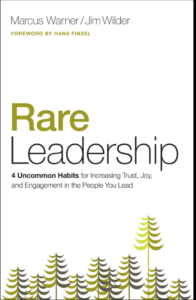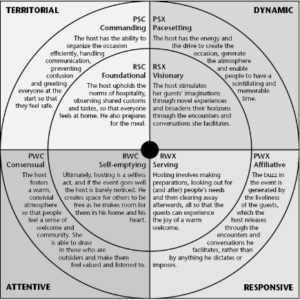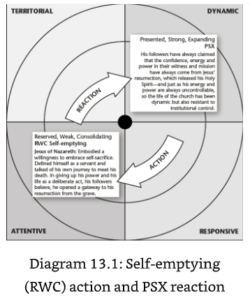Mit tenne Jézus? (Hungarian)
Mit tenne Jézus? (Hungarian) – What would Jesus do?
Highlights
Part 1 Rare Leadership & More than a menu
Part 2 Chapter 13, What would Jesus Do?
Part 3 Indigenous Church: Self Supporting, Self-Governing, Self-Propagating. GoodSports International
Part 4 Summary
Part 1 – Rare Leadership & More than a Menu
Rare Leadership
The DLGP study of leadership continues to intrigue me with the amazing varieties of styles that are revealed with each book that we read. Before I move onto Walker’s book, I wanted to share something am reading concurrently, it is called Rare Leadership, Marcus Warner and E. James Wilder. One of the statements struck me (and is impacting my reading of Walker) …He writes “Act Like Yourself” which I initially thought was going to be a chapter on “you do you,” but instead it called us to ask the question “What would the person God made me to be do? He calls us to be our best selves (p.15), as an example he shared something that reflects my life circumstances, “I’ve been in many situations where this inability of a leader to act like “his best self” has led to a downward spiral in morale, resulting in the loss….” Ouch. This clearly describes my current situation.
revealed with each book that we read. Before I move onto Walker’s book, I wanted to share something am reading concurrently, it is called Rare Leadership, Marcus Warner and E. James Wilder. One of the statements struck me (and is impacting my reading of Walker) …He writes “Act Like Yourself” which I initially thought was going to be a chapter on “you do you,” but instead it called us to ask the question “What would the person God made me to be do? He calls us to be our best selves (p.15), as an example he shared something that reflects my life circumstances, “I’ve been in many situations where this inability of a leader to act like “his best self” has led to a downward spiral in morale, resulting in the loss….” Ouch. This clearly describes my current situation.
Before I go back to Walker, RARE (leadership)=
R- Remain Relational (belonging)
A – Act like yourself (identity)
R- Return to Joy (being glad to be together)
E- Endure hardships well (using hard times to bring us closer)
These elements resonate with Walker’s talk about hospitality.
More than a Menu
Simon Walker’s, Leading with nothing to lose training in the exercise of power , was a paradigm shift for me. I have always seen leadership as the exercise in power, and yet his take on hospitality has been game changing for me. Especially as I transition from one organization (GoodSports International -25 years in Hungary), to work in Ukraine. As I submitted appropriate forms for establishing GSI Ukraine, I wondered “What foundations will I set for the new organization?” More specifically, in Walker’s Appendix: Troubleshooting Problems in Leadership, he states “What are your foundations going to be? You need to establish core values, expected behaviours, standards, goals, routines and rhythms. Are you clear about yours? “
These are all the questions that the NGO application asked. My habit of leadership (US Army = 23 years, 6 months, 11 days) has always been my default setting even while serving as a missionary in Hungary. When I first glanced at the Undefended Leader, I figured I would be in tuned to Churchills strategy, Pacesetting action. I was surprised to see that Walker had created, not a pigeonhole for leadership, but “reaction and action.” What emerged, for me, was this interplay of leadership strategies “seasons” responding to the leader’s environment.
6 months, 11 days) has always been my default setting even while serving as a missionary in Hungary. When I first glanced at the Undefended Leader, I figured I would be in tuned to Churchills strategy, Pacesetting action. I was surprised to see that Walker had created, not a pigeonhole for leadership, but “reaction and action.” What emerged, for me, was this interplay of leadership strategies “seasons” responding to the leader’s environment.
His Diagram 10.1 (and others) remind me of the “Ying and yang,” the ebb and flow of leadership strategies.
yang,” the ebb and flow of leadership strategies.
Part 2. Chapter 13, What would Jesus Do?
 I had imagined that all the Christians in our bunch would pile on to Walker’s Chapter 13, where Jesus and the Self-Emptying Strategy (RWC) resided. It would answer the question, “What would Jesus do?” We all want to be more like Jesus so I started with this chapter, I figured I would score points if I dove into Self Emptying. Once again, I discovered something revelational. Christ’s leadership purpose (arguably His Spiritual purpose) of sacrifice, caused his disciples to become just like Winston Churchill (PSX), expanding the Kingdom. I had never imagined that I would place Churchill and Paul in the same stream of thought. What surprised me initially, however, was that Walker seemed to be less keen on Christ’s Servant Leadership. “On the one hand…there’s the idea of the leader as hero, strong, capable, brave, who takes problems on and overcomes them. And then on the other, there’s Greenleaf’s idea of “servant leadership.” They seem to be at two ends of a scale. One is about power, the other about passivity…. Neither quite seems to capture what leadership is all about.’ (Location, 2509).
I had imagined that all the Christians in our bunch would pile on to Walker’s Chapter 13, where Jesus and the Self-Emptying Strategy (RWC) resided. It would answer the question, “What would Jesus do?” We all want to be more like Jesus so I started with this chapter, I figured I would score points if I dove into Self Emptying. Once again, I discovered something revelational. Christ’s leadership purpose (arguably His Spiritual purpose) of sacrifice, caused his disciples to become just like Winston Churchill (PSX), expanding the Kingdom. I had never imagined that I would place Churchill and Paul in the same stream of thought. What surprised me initially, however, was that Walker seemed to be less keen on Christ’s Servant Leadership. “On the one hand…there’s the idea of the leader as hero, strong, capable, brave, who takes problems on and overcomes them. And then on the other, there’s Greenleaf’s idea of “servant leadership.” They seem to be at two ends of a scale. One is about power, the other about passivity…. Neither quite seems to capture what leadership is all about.’ (Location, 2509).
Walker’s perspective alarmed me at first (APOSTASY!) but this shook me from my “pigeonhole box search for MY Leadership strategy”, to enjoying spectrums of leadership responses imaged by Walker’s, Territorial, Dynamic, Attentive, Responsive Matrix.
For years I have watched the study of leadership take us into tests like Myers-Briggs that identify your personality type, and then like lambs, young leaders reshape themselves so that they can fit in their newfound personality style.
Not so, with Walker. Our esteemed Travis and Tim describe Walkers Matrix as a toolbox, they see these leadership strategies as resources where one can pull the proper tool to match the leadership situation. For me this was a revelation. I have a tendency to see all problems as a nail. Thus, I wield my hammer (much like Thor) with force and violence.
Chapter 13 reinforced what I knew of Christ’s leadership style, and it also hammered home a lesson that I am relearning right now. I guess the bottom line is “Letting Go, Let God” and the Baptist philosophy on Self-supporting, Self-governing, and Self-propagating.
Or more correctly, Henry Venn, along with American missions leader Rufus Anderson, argued that New-Testament-style churches should have local leaders. In addition, those churches would be financed locally, and they would be doing effective evangelism, discipleship, and church planting on their own with local resources. Venn said these native or indigenous churches would be: Self-supporting, Self-governing, and Self-propagating
Part 3: Indigenous Church: Self Supporting, Self-Governing, Self-Propagating. GoodSports International.
The RSX strategy of withdrawing is the strategy that has emerged for me in Hungary. My presence must grow lesser so that a new generation of Hungarians can rise to the effort of sharing Christ’s love in their own spectacular ways (PSX). This new generation will face the trials of being self-supporting, self-governing and self-propagating in culturally significate ways, that I as an American (Thor) could never explore.
Part 4: Summary
I wander back to Rare Leadership and share this last quote by John Trent, “It’s rare to find a book that links “joy, modern brain science, and biblical wisdom as a model for leadership.” Had I forgotten Joy?
In Walker’s focus on hospitality (and perhaps my lack of joy), I began to see that I focused on Hero or Servant. Finding the Joy in using the range of emotions and actions (Leadership strategies) that God has empowered us with is something I look forward to employing as we explore work in Ukraine.
Shalom…y’all
[1] Warner, Marcus, and E. James Wilder. Rare Leadership: 4 Uncommon Habits for Increasing Trust, Joy, and Engagement in the People You Lead. Chicago: Moody Publishers, 2016.
[2] Walker, Simon P. Leading with Nothing to Lose: Training in the Exercise of Power. Carlisle: Piquant, 2007.
[3] Greenleaf, Robert K. Servant Leadership: A Journey into the Nature of Legitimate Power and Greatness. New York: Paulist Press, 1977.
[4] “The Three Selfs of Indigenous Churches.” Accessed September 10, 2023. https://home.snu.edu/~hCULBERT/3selfs.htm.
9 responses to “Mit tenne Jézus? (Hungarian)”
Leave a Reply
You must be logged in to post a comment.
Russ, as I read your post, it began to occur to me how much Walker’s book indeed created a paradigm shift in my thinking, too. This is also why it is going to require a more-than-inspectional reading. I get why we do personality profiling and temperament testing (you mentioned Myers-Briggs), as these can be helpful tools in understanding how a leader may be wired. But different contexts seem to require different leadership strategies. Perhaps a leader who is “wired” in a certain way may indeed exhibit a style in which he/she goes about leveraging power. But how much space does that leader and the organization need to leave open for leveraging one’s competencies to apply an appropriate and different strategy (rather than…”here’s how I’m wired, so this is how I’m going to lead”)?
Not every context requires pacesetting, and this was something I was working out in my blog post. It seems that my current context is requiring a different strategy, and Walker has given me some handles to work with.
I am reading your thoughts, and Russells, and my work with a non-profit that tries to help ministry teams operate more inter-dependently comes to mind.
1. How/where does Spiritual gifting get worked into the calculous? When we prescribe a personality review, we often will bring gifting into the discussion, and it may help in these questions, as well.
2. How do the personalities of those we lead also contribute to our response? Do we not only leverage our own personalities but those who are on our team to create an effective leadership approach?
I keep on returning back to “old dogs and new tricks.”
Once upon a time I would have said enough…no new things…Zotero, Obsidian, ChatGPT and now leading strategies arrayed in toolbox.
Wow. I would have said I could not have changed from using a Hammer. But all things are possible with God.
Shalom…
I guess there is space to learn something new. At age 64, I am resistant to change. But recently, my method of leadership was called “toxic.”
My response was one of anger (not the best place to be…in your anger do not sin). But of course in my anger I did sin…severing relationships and burning bridges.
In the breathing space after (summer months), God is teaching me to 1) Turn the other cheek, 2) Forgive, and 3) to return to Joy (from Rare Leadership).
Now I am being purposeful in changing my leadership strategy as we are launched into Ukraine (not knowing where we will land).
Shalom…
Russ,
I’ve not heard of the book RARE Leadership but I resonate with the concepts. I’ve seen far too many leaders (including myself when I was younger) not be ok with who God has made them to be and try to be someone else. I think I’ll put that book on my “to read” list.
I was struggling with Walker too… in a good way. I, too, thought it would be about finding my niche, focusing on my strengths, etc. And there IS something about knowing who God made you to be. But while grasping that we have to learn to operate in ways that might feel out of our natural response styles but that will serve God’s purpose in others best.
Ultimately I think this keeps us humble servants to the Master to be used however He sees fit.
Russ,
I, too, appreciated Walker’s highlight of Jesus’ leadership strategy. You referred to “the Baptist philosophy on Self-supporting, Self-governing, and Self-propagating”. I am unfamiliar with that philosophy and context. Please explain. Safe travels!
While attending Dallas Baptist University, I was introduced to Henry Venn…”Venn and Rufus Anderson of the American Board of Commissioners for Foreign Missions were the first to use the term “indigenous church” in the mid-nineteenth century. They wrote about the necessity for creating churches in the missions field that were self-supporting, self-governing, and self-propagating (Venn used the term “self-extending”).[6] Venn is often quoted as encouraging the “euthanasia of missions,” which meant that missionaries were to be considered temporary workers and not permanent.[7]= Shenk, Wilbert R. (1977). “Henry Venn’s legacy”. Occasional Bulletin of Missionary Research. 1 (2): 16–19. doi:10.1177/239693937700100204. S2CID 156759380.
This forces the missionary to take a long term view of his role in God’s Tapestry. We are but one thread that contributes to His story of missions (for me in Hungary and now Ukraine).
R- Remain Relational (belonging)
A – Act like yourself (identity)
R- Return to Joy (being glad to be together)
E- Endure hardships well (using hard times to bring us closer)
These elements resonate with Walker’s talk about hospitality.
Never heard of this book, but I love the Acronym. Especially the part where it encourages us to be ourselves. One of my friends who runs a local non-profit was insecure about being a leader because she did not feel like her personality was “professional” enough. She is happy go lucky, bubbly, and playful. This part of herself has drawn people to the organization because she mixes dedication, hard work, and passion with FUN!
Thanks Adam,
“Act like your self” is broadened in the book Rare Leadership. The authors poked me in the eye, when they suggested that my reactions should be those of ” the BEST person God has made me to be.”
Ouch. This summer was plagued with unforgiveness and anger. Definitely not meeting the criteria for being the BEST that HE made me to be.
But we live and learn. Now I am turning the other cheek, forgiving and rebuilding bridges. Sigh…never to old to be schooled by HIM.
Shalom